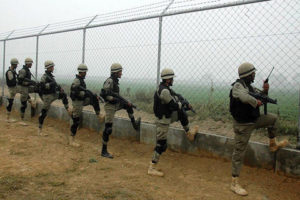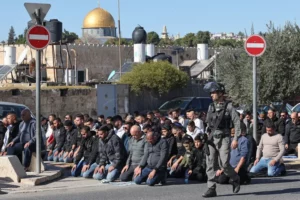
Scottish Muslim community is spearheading a national campaign that aims to prevent youth from being radicalized, amid growing threats of extremism across the UK.(Photo: On Islam)
Cairo, 13 Rabi’ul Akhir 1436/3 February 2015 (MINA) – Leading Scotland’s efforts to fight terrorism, the Scottish Muslim community is spearheading a national campaign that aims to prevent youth from being radicalized, amid growing threats of extremism across the UK.
“The biggest challenge we face in Scotland is the dangers posed by the internet in radicalizing our youth. We simply cannot control the online content posted by those abroad,” the Muslim Council of Scotland (MCS) convener Dr Javed Gill told the Herald Scotland on Sunday, February 1.
“It is also vital that parents play a greater role in what their children are watching on the internet. The videos made by the likes of Islamic State are very professional, very appealing, On Islam quoted by Mi’raj Islamic News Agency (MINA) as reporting.
“Although the reality on the ground will be completely different from what is portrayed online.”
Also Read: UN Rights Office Reports 798 Gazans Killed While Seeking Humanitarian Aid Since Late May
The British government claims that up to 600 Britons, including two Scots, have traveled abroad to take part in fighting in Syria, and that at least 218 have returned to the UK.
Joining forces with the Scottish security authorities, MSC has been leading a nationwide anti-radicalization campaign to fight extremism online.
Scot Muslims leaders have also highlighted the vital rule of parents and Imams to dissuade Muslim youth from joining jihad abroad.
“Imams should speak the language relevant to young people and that is English and address issues such as drugs and anti-social behavior and not pretend issues like this don’t exist,” Gill urged.
Also Read: US National Education Association Passes Resolution to Ban Pro-Israel Curriculum in Schools
“We are seeing a pattern from the killers of Lee Rigby to the attackers in Paris – young men who were street gangsters, who spent time in prison and as they grew older they turned to extremism.
“Some were new to Islam and if those who have converted feel they are being alienated and not supported by the mainstream community, they are vulnerable and will be targeted by extremists.”
According to Jihadim experts, both local and practical factors like cultural constrains influence youth tendency toward radicalism.
“Local factors are important in determining whether someone is likely to travel overseas,” Sarah Marsden, of the Handa Centre for the study of Terrorism and Political Violence at the University of St Andrews, said.
Also Read: Macron Urges Joint France-UK Recognition of Palestinian State
“As well as the complex and highly individualized internal processes associated with the decision to fight in the ‘global jihad’, there are practical factors that are also influential. For example, networks of friends are important.”
De-radicalization
As UK toughens sanctions against British fighters returning from conflict areas, stripping their nationalities, Muslim leaders said that the country should work to rehabilitate them instead.
“Just like ex-drug addicts are used effectively to discourage others from taking drugs, there should be a key role for certain individuals returning from such conflicts, after being correctly vetted, discouraging others from following their path,” Ahtsham Ali, the Muslim Advisor to the Prison Service in England and Wales said.
Also Read: Heat Wave Across Europe Causes 2,300 Deaths, Study Finds
“If British fighters in Syria are dispirited and disillusioned with ISIS, after the stark reality of conflict and the cruelty of ISIS hits them, which they cannot identify with Islam, then in effect they have already been somewhat de-radicalized.
In November, the British government introduced a set of new anti-terrorism measures.
Under new “exclusion orders”, British Muslims travelling abroad to take part in the conflict in Syria and Iraq would be barred from returning to Britain, unless they agreed to be placed under strict controls. UK Muslims would also face arrest after coming from the conflict areas in the Middle East.
Ali, who oversees over 200 Imams or Muslim Chaplains catering for the religious needs of 14,000 Muslim prisoners, insists that returning fighters should be involved in the country’s effort to fight radicalism.
Also Read: Top Economists Defend UN Gaza Report, Expose Global ‘Genocide Economy
According to the Muslim advisor, family breakdown, lack of male role models, low educational achievement and aspiration are the main reasons behind crimes committed by Muslim youth.
Despite radicalization threats in UK, several Scot Muslim leaders stressed that extremism has no place among the Muslim community there.
“I have travelled across Scotland and there are no radical preachers in Scottish mosques who are urging Muslims to commit violence abroad or at home,” Gill of MCS stated.
Moreover, Muslims leaders claim that previous radical groups’ efforts in their island ended in “failure”, thanks to the socio-economic make-up of the Scottish Muslim community.
Also Read: 26 Former British Diplomats Urge Recognition of Palestinian State
“During the 90s, they [Hizb ut Tahrir and Al Muhajiroun] did attempt set to set up a presence and organized a few events in Glasgow but could not find enough local individuals who would carry on their work,” Sajid Quayum, who has been involved with a number of Islamic youth related groups in Scotland – and is a founding member of Radio Ramadhan, said.
“Their message was based on isolation and separation rather than tolerance and mutual respect.”
The highly integrated Muslim community has been widely seen as an integral part of the Scottish society by other communities.
“Having many Muslim friends across the UK and having grown up amongst the Muslim community in Scotland there is little doubt in my mind that integration amongst Scotland’s diverse communities is much better here than in other parts of the UK,” Humza Yousaf, a member of Scottish parliament and the Scottish government’s minister for international development, said. (T/P011/P3)
Also Read: EU Commission Finds No Evidence Hamas Stole Aid in Gaza
Mi’raj Islamic News Agency (MINA)





































 Mina Indonesia
Mina Indonesia Mina Arabic
Mina Arabic